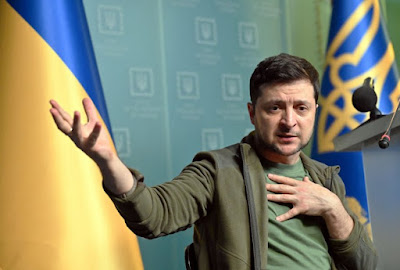Right now the destiny of our country is being decided. The destiny of our people, whether Ukrainians will be free, whether they will be able to preserve their democracy. - Volodymyr Oleksandrovych Zelenskyy Address to the US Congress (16 March 2022)
It is also important to mention that in three days we will be observing the day 10 years ago when Oswaldo Payá Sardiñas and Harold Cepero Escalante were murdered by the secret police in Cuba. You can learn about Oswaldo in this building at the Museum of the Victims of Communism.
I want to review some lessons from what has happened in Ukraine, and not just over the past few months, but over the longer term.
Lesson #2 Words must be backed by actions.
"People don't really believe in words. Or rather, people believe in words only for a stretch of time. Then they start to look for action." - Volodymyr Zelensky (2020 on joining the EU).
 |
| President Volodymyr Zelensky |
President Zelensky's observation, made in 2020 with reference to Ukraine's relations with the European Union, applies today with Western promises of support for Kiev following Russia's invasion of Ukraine.
Prior to the 2014 Russian seizure of Crimea, Ukraine did believe in words from the West.
When negotiations between Ukraine and Russia broke down on removing nuclear weapons from Ukraine in September 1993, Washington engaged in a trilateral process with Ukraine and Russia. Yes, Ukraine had nuclear weapons in the 1990s. This resulted in the January 1994 Trilateral Statement. Ukraine agreed to transfer its nuclear warheads to Russia. In exchange, Ukraine received security assurances from the United States, Russia, and the United Kingdom.
The failure of the West to restrain Russia from invading Ukraine in 2014 and expanding the war of conquest in 2022 gives a lesson to captive nations and others that giving up nuclear weapons in exchange for security guarantees is a foolish bargain. Putin's war in Ukraine is a blow against nuclear disarmament.
By 2019, with regards to Russia and the West, President Zelensky observed in a Time interview: " I don’t trust anyone at all."
Many Cubans understand that statements condemning the actions of the Cuban dictatorship after July 11th without specific actions by the international community to hold the regime accountable will not end the ongoing repression by the dictatorship in the same manner that Vladimir Putin's aggression was not met with strong resolve, and stopped.
I know that they [the Russian state] won’t show my address on Russian TV, but Russian people have to see it. They need to know the truth, and the truth is that it is time to stop now, before it is too late. And if the Russian leaders don’t want to sit with us behind the table for the sake of peace, maybe they will sit behind the table with you. Do Russians want the war? I would like to know the answer. But the answer depends only on you, citizens of the Russian Federation.” - President Zelensky, February 23, 2022
Ukraine also provides an important lesson in distinguishing between the Cuban dictatorship and the Cuban people.
 |
| Ukraine's deputy foreign minister, Emine Dzheppar |
Ukraine's deputy foreign minister, Emine Dzheppar, on February 27, 2022, tweeted: "The MFA of Ukraine in a diplomatic note expresses its strong protest against the statements of the Government of Cuba in support of Russia's aggression against Ukraine and calls on Cuba to urge Russia to put an end to this aggression."
Free Cubans in Cuba, in contrast, were, and are, demonstrating their solidarity with Ukraine, criticizing the Castro regime's support for Putin's actions, leading to arrest by the political police.
Many Cubans rejected (and continue to reject) the war on social media and in messages to the Ukrainian Embassy in Havana. The volume of the calls was so "extraordinary," the Ukrainian embassy in Havana said, that it asked Cubans to send their messages of support to a dedicated email address to clear the phone lines.
Cuban activist Pablo Enrique Delgado Hernández on Saturday, February 26, 2022 went to the Ukrainian Embassy in Havana to demonstrate his solidarity. Pablo Enrique after meeting with a Ukrainian diplomat and presenting her flowers was arrested by the National Revolutionary Police and taken to the Seventh Unit police headquarters and interrogated.
Lesson #4 Importance of disobedienceLesson #5 There are simple answers, but no easy answers.
"There are no easy answers, but there are simple answers. We must have the courage to do what we know is morally right." - Ronald Reagan







No comments:
Post a Comment